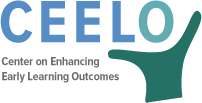PLANNING FOR THE NEW EARLY LEARNING MODEL: THE NEXT SCHOOL IMPROVEMENT GRANT (SIG) CYCLE
On April 23, 2015, CEELO and the Center on School Turnaround (CST) hosted an online session designed for state early learning and school improvement administrators gearing up to include the early learning model in their school improvement plans under the new rule for the SIG grants.
Presenters reviewed the eight components* of the new model and discussed key requirements, including school leadership and expanding high quality prekindergarten and full-day kindergarten. Participants heard about opportunities provided by the early learning model and received key resources and information for state leaders. Charlie Geier, Director of Early Learning and Intervention in the Office of Early Learning and Intervention, Indiana Department of Education, shared what the new early learning model means for the state of Indiana and examples of how Indiana is working to support the key components of the SIG.
Key resources:
- Webinar Slides
- Webinar Recording
- School Improvement Grants. Guidance and Tools for the 2015 Amended Regulations: Maximizing the Optional Planning/Pre-Implementation Year – CST has prepared a guidance document for states, districts and schools as they plan for the Pre-Implementation Year of the new School Improvement Grant Cycle. It will be very helpful for you to take a look at this important resource prior to our webinar.
- Incorporating Early Learning Strategies in the School Improvement Grants (SIG) Program – CEELO and CST together conducted this case-study providing an on the ground view of schools implementing robust early learning strategies in their turnaround efforts. The report is a useful resource for preparing to address the early learning model.
*The eight components are:
1. Implementing each of the following early learning strategies:
– Offer full-day kindergarten
– Establish or expand a high-quality preschool program
– Provide educators, including preschool teachers, with time for joint planning across grades
2. Replacing the principal who led the school prior to commencement of the early learning model.
3. Implementing the a rigorous, transparent, and equitable evaluation and support systems for teachers and principals that is required under the transformation model.
4. Using the teacher and principal evaluation and support system to identify and reward school leaders, teachers, and other staff.
5. Implementing financial incentives, increased opportunities for career growth, and more flexible work conditions that are designed to recruit, place, and retain high quality staff.
6. Using data to identify and implement an instructional program that (a) is research-based, developmentally appropriate, and vertically aligned from one grade to the next, as well as aligned with state early learning and developmental standards.
7. Promoting the continuous use of student data (such as from formative, interim, and summative assessments) to inform and differentiate instruction.
8. Providing staff ongoing, high-quality, job-embedded professional development such as coaching and mentoring to ensure they are equipped to facilitate effective teaching and learning.
